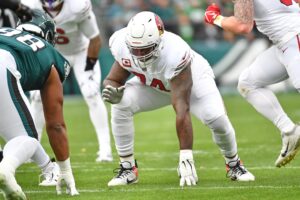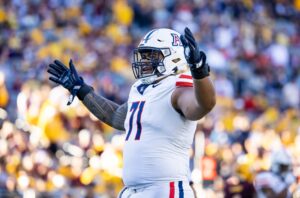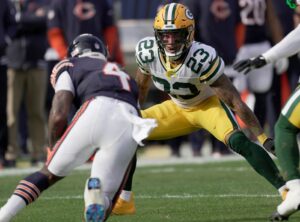The Kansas City Chiefs dwindled away opportunity after opportunity against the New York Giants in a 12-9 overtime loss. The poignant winds of Met Life Stadium built a haunting onus before the game, and the Chiefs fell directly into that trap. Alex Smith tossed two interceptions, played flat, and failed to generate creativity amidst opportunity. The Giants defense schematically and mentally played sharper than the Chiefs amplitude of conviction. Nine penalties, three team interceptions, and a zero for three rating on red zone trips doomed the Chiefs to letting a trend of mistakes generate a certified disappointment.
Week 11 Kansas City Chiefs Takeaways
1) Flat and Inefficient During Regulation
Less the final drive of regulation, the Chiefs offense was predominantly flat and inefficient. Multiple times they found ways to makes mistakes and lose control of momentum. The heart-stopping momentum the Chiefs usually generate from explosive plays did not exist for the first 60 minutes of play.
Kareem Hunt received the call to run only 15 times in regulation, while Charcandrick West saw the ball four times. Even with intermittent explosive running plays, the bane of the Chiefs was going three of 10 on third downs. Whether the source of the problem be play calling, fundamentals, or institutional urgency, the Chiefs first half offense was flat.
Conversely, the Giants secondary finally came alive for a 2016 reunion. Defensive coordinator Steve Spagnuolo generated pressure on high leverage downs, forcing Smith to check down to short targets often. When the ball was caught, the Giants defense gang-tackled and cut opportunity from the hands of Tyreek Hill and the bevy of other athletic weapons. Whenever Smith opted to go deep, Janoris Jenkins and Landon Collins were floating around the ball, easily jumping the pass with foresight.
In summation, the first half offensive attack featured a traditional Chiefs scheme the Giants defense dissolved by generating pressure and playing ball-hawk defense.
2) Overtime Implies No Time
Overtime was not much better for the Chiefs. After their first drive got off to a fast start with Hunt churning for extra yards, a holding penalty negated the run. Penalties, once again, haunt the team as mental errors were the death knell.
Once Eli Manning and the Giants received the ball, Manning pulled out some of his best football this year. He stood in the pocket, calm, controlled, and knowing exactly where to paint the pass. The Chiefs defense that had forced their own style of inefficient play during the first half, gave way to several big plays that let Manning align himself in a beautiful formation for the winning play.
On a fourth and six, Manning put a ball over Marcus Peters shoulder, forcing pass interference, while Roger Lewis caught an incredible pass on his finger tips to land the Giants at the two-yard line. The onset of overtime was a complete lack of energy from the Chiefs defense; overtime implies pressure, which implies playing fast, which ought to imply operating as if every second is the last. Juxtaposed to the Chiefs defense, Manning lead the Giants offense as if every play were the last second.
The capitulation of the Giants winning field goal drive was not only no pressure, but no hint of pressure. Manning began the drive by letting Orleans Darkwa and Wayne Gallman grind the ball forward to set up a different play set. The run put the Chiefs pressing forward into looking for more as Manning quickly dropped back and ushered the ball to Lewis twice.
3) An Ocean of Questions
A bevy of questions personified the entire game. First, the play calling, usually an exquisite part of the game, featured stubbornness from Andy Reid. Even when Hunt or West generated success running the ball, no rhythmic play calling was established. This includes a crazy call for Travis Kelce to fundamentally punt the ball as he threw a duck of an interception downfield on a third-down trick-play call. Kelce’s pass was not only awkward, but hinted at desperation. The Chiefs offense was wholly bereft of purpose throughout most of the afternoon.
However, opting into purpose is difficult when nine different penalties are committed. Whether holding, false starts, or even defensive mental mistakes, the Chiefs drowned themselves in penalties. From the onset of the season, the Chiefs have kept themselves in the conversation as the most penalized team in the NFL. Eventually, a trend line of penalties will kill any hint of success.
Another trend line that has been scary since week one is the Chiefs defense breaking more often than bending. Fortunately, the Giants own bevy of inept mistakes in high leverage situations allowed the Chiefs to hold them to three of 13 on third downs. Yet, throughout the tenure of the game, Darkwa, Gallman, and Shane Vereen combined for 28 carries and 106-yards. The Chiefs run defense has been, and will continue to be, a turnstile.
The second part of the Chiefs defensive question is generating no sacks on the day. Although an institutional lack of pressure and urgency managed to hold the Giants to nine regulation points, the trend line of no sacks broke through in overtime and allowed exquisite passing from Manning. The Chiefs pass rush is one of the highest percentage takers in the salary cap and is a key to generating success. Whenever the highest paid part of a salary cap falters, certain doom is an angry cloud on the ocean’s horizon.
Main Image:






